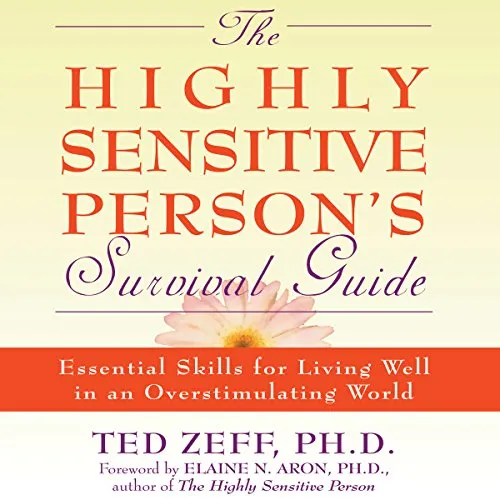“Don't take it so close to your heart”, “Be tougher!”, “You are too sensitive and receptive”, “Don't be like a child” - how often throughout my life have I heard these phrases.. But it is easy for others to say: “Do not take to heart". How do they know what the depth of my heart is? And where is close for him?
I have always felt that I was not like others. I perceive and feel any impact, both external and internal, more deeply and strongly. I fully experience everything that happens to me, as if there are no mental models in my head, and there is no skin on my heart..
I have always been too soft and vulnerable, subject to inexplicable emotional outbursts - sometimes I am the happiest person in the best of the worlds, sometimes the most unhappy when the world seemed cruel and imperfect to me.
I subtly felt and empathized with people, and often for their sake I acted to my own detriment. I was offended and cut off communication as soon as I felt the slightest falsity and insincerity. I was often disappointed, tired of everything, and strived for solitude and loneliness.
On the part of other people, my actions and reactions looked strange and ambiguous. I myself did not understand why I was like that, why I behaved this way, but nothing could be changed. My nervous system acted on its own, independently of me.

For a long time I could not accept these features of my psyche, my character, I suffered from misunderstanding and rejection, and more and more distanced myself from people, from communication, from an active lifestyle.
Indeed, in the modern world, a man is ashamed to look like a sensitive weakling. That is why I had to hide my feelings, constantly keep in good shape, pretend that I was firm and unperturbed.
Resisting and suppressing my characteristics, I moved away from my true self, because it seemed to me that something was wrong with it.
Until I found out that I am a highly sensitive person.
Who are highly sensitive people?
For the first time, highly sensitive people, as a separate group, were identified by psychologist Elaine N. Aron in her book "The Highly Sensitive Person", which was published in the USA in 1996. In it, Dr. Aron writes that 15-20% of people have a highly organized nervous system that processes information both from the inside and from the outside much more reflectively and deeper than other people. But not because they are weak or somehow wrong, but because of their genetics.
And these are not just emotions. Hundreds of studies are devoted to high sensitivity, from brain scans to genetic tests. The study of the HSP brain shows that their brain processes are different from those in the brain of other people.
The abbreviations HSP and SPS are often used in hypersensitivity materials. The first is called Highly Sensitive Person, and the second is the reason that makes them so fragile. The central nervous system of some people is literally more sensitive - it reacts more strongly and processes physical, emotional and social stimuli more deeply. This phenomenon is called Sensory Processing Sensitivity.
Indeed, research shows that hypersensitive people are more active in thought and neurochemical processes in areas of the brain responsible for attention, planning, decision-making, and violent inner experiences. HSPs are more likely to experience superempathy, are more attentive to their surroundings, and understand other people better.
Neuroscientists also noted that hypersensitivity corresponds to a certain survival strategy, it is not a pathology, but a feature of the emotional, cognitive and behavioral organization. According to psychoanalyst Saverio Tomasella, hypersensitivity most often means increased sensitivity, or strong emotionality, or greater expressiveness.
Elaine Aron has developed a separate 27-point sensitivity scale to highlight HSP levels, and just like introverts, this is not just a binary system - you are not just either highly sensitive or not, there is a gradation here.
Many people compare the concept of "hypersensitivity" with the well-known concept of "introversion". But "new introverts," as hypersensitive people are called, by their nature, have a wider range of reactions, and if introverts are primarily determined by their relationships with other people, then highly sensitive people are generally determined by their attitude to the world. Interestingly, according to statistics, about 30% of highly sensitive people are extroverts.
How do highly sensitive people differ from ordinary people?
Highly sensitive people perceive more and more deeply, and are sensitive not only to their own emotions, but also to those of others. They react to everything brighter and more emotionally.
They are often suspicious, and tend to indulge in reflection and self-reflection. They are prone to anxiety and depression, often driving themselves to emotional exhaustion.
They subtly and intensely feel the energy of the environment. They often have a deep connection with nature, they have developed intuition and discernment, they are very spiritual.
They have a rich imagination, and they often cannot express in words what they feel and experience.
They have a high level of empathy - they become infected with the emotions of other people, worry more about others, about themselves and the whole world, about their personal and common future.
Such people think deeply, love to "dig deep". They often ask global questions and problems, for example, a question about their purpose and purpose in life, from early childhood they start themselves: "Why do I live on this Earth?"
They are attentive to the details of the situation and the subtleties of the circumstances. From this, they try to take everything into account and control and fall into a stupor when they have to make a choice. They can be confused even by the simple task of choosing an ice cream in a store.

They avoid conflict situations, as this takes up all their energy. They react very painfully to criticism. Therefore, they often find it difficult to make decisions and take responsibility.
Perfectionism is inherent in them - it is always difficult to be satisfied with some kind of achievement, and not strive for even better, for perfection, albeit unattainable.
They get upset when they make a mistake. Mistakes upset everyone, but highly sensitive people especially: because of annoying little things and oversights that others have forgotten to think about, they can suffer for weeks, imagining that they have not yet been forgiven.
They cannot watch horror films, scenes of cruelty and violence on the screen, and melodramas make them cry.
They cannot work in an open-space office: constant noise and fuss, bright lights, loud conversations and extraneous stimuli - all this makes highly sensitive people go crazy. They are generally incapable of working under pressure: they can be overwhelmed by external stimuli when there are too many of them or they are too intense.
They definitely need time to be alone from time to time.
Oversensitivity is not weakness!
Having accidentally learned about how many highly sensitive people there are in the world, I realized that I am far from alone. By exploring the general characteristics and characteristics of such people, I began to better understand and appreciate my heightened emotional sensitivity. I realized that she is not a sign of weakness - this is a feature of the psyche that we do not influence.
From some point on, I was able to understand and accept that my characteristics are not only the cause of vulnerability, but also a valuable gift. That it is not a bad trait to get rid of, but a valuable gift to be used.
And this is not weakness, but strength. This is strength, since we have to experience and overcome much stronger and deeper influences than others.
We are not weak, we are just more vulnerable. We are not weak, we just get tired faster. We are not sissies, it just hurts us more.
Most people consider hypersensitivity to be a disadvantage. It seems to them that with such qualities it is impossible to achieve anything in life. But these are just individual traits of a highly developed person that can be controlled and used to their advantage.
After all, as in everything else, in hypersensitivity one can find its advantages.
Strengths of HSP
Analytical thinking. The main advantage of hypersensitive people is that they pass a lot of information through themselves and reveal incredible connections in it that others do not notice. " They are able to focus precisely on a goal, make deliberate choices, conduct comprehensive analysis, and ultimately come up with brilliant ideas. The ability and desire to analyze, attention to detail, the ability to concentrate and delve deeply into the process is a useful skill in life and at work.
This allows highly sensitive people to notice changes in a friend's or partner's behavior, work environment, and market situation earlier than others. Such a person is a valuable member of the team, because it is he who will be able to carefully study all aspects of the case, calculate the risks and notice the nuances that are invisible to others.
The ability to empathize evokes sympathy from others, and is also a valuable quality for many professions related to communication with people.
A special understanding of beauty and harmony - in nature, art, music. Highly sensitive people are often highly creative people - poets, writers, musicians, scientists, and philosophers.
Perhaps you know such people? Perhaps you recognize yourself?
Well then, congratulations, you are a hypersensitive person!
Then perhaps you should take a closer look at this topic, as it will help you change and improve your life.
Where else to learn about hypersensitivity
In addition to the fundamental book by Elaine Aron, «The Supersensitive Nature. How to Succeed in a Mad World», which became a bestseller and was translated into 18 languages, the book of Doctor of Psychology Ted Zeff «The Highly Sensitive Person's Survival Guide « is also quite famous in popular literature. Zeff focuses on guidelines and adaptive techniques that can help HSPs cope with stressful everyday life.

Another psychotherapist working with hypersensitive people is a specialist from Denmark, Ilse Sand. In his books «Highly Sensitive People in an Insensitive World: How to Create a Happy Life» and «Close to the Heart. How to live if you are too sensitive person» she talks about the difficulties that hypersensitive people have to face, constantly making excuses for their characteristics. Sand provides examples from therapeutic practice, citing her hypersensitive patients.
The documentary «Sensitive -The Untold Story», based on research by Elaine Aron, shows real people with innate hypersensitivity. The film is based on interviews with patients and their stories, with scientists making scientifically proven arguments about SPF, and also contains comments from the founder of the theory.
In general, now, after twenty-five years of researching this phenomenon, there are quite a lot of materials about it and you can easily find what is closer to you.
So, is hypersensitivity a problem? Does it interfere with being yourself? Does it hinder happiness and enjoyment of life?
It can become a hindrance if you ignore its characteristics, it can interfere with self-expression or negatively affect relationships. But if you study it well and learn how to use it for good, it can enrich our life, make it interesting, rich and harmonious. Not only for yourself, but also for the sake of other people.
Not without reason the French psychoanalyst Saverio Tomasella claims that hypersensitivity is, first of all, "an expression of great inner wealth" and considers it to be one of the catalysts of our humanity.
